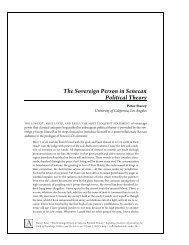Deceit, Desire, and the Literature Professor: Why Girardians Exist
Deceit, Desire, and the Literature Professor: Why Girardians Exist
Deceit, Desire, and the Literature Professor: Why Girardians Exist
Create successful ePaper yourself
Turn your PDF publications into a flip-book with our unique Google optimized e-Paper software.
LANDY | DECEIT, DESIRE, AND THE LITERATURE PROFESSOR: WHY GIRARDIANS EXIST 7<br />
IMITATION-FREE DESIRE<br />
But <strong>the</strong> hardened <strong>Girardians</strong> will say, “What do you mean, any desire, even non-mimetic? There<br />
is no such thing as non-mimetic desire!” So let’s return to Stage One of <strong>the</strong> <strong>the</strong>ory: all desire is<br />
mimetic; we do not desire things for intrinsic reasons, but only because a person we admire in<br />
some way (a “mediator”) has desired <strong>the</strong>m first. Where to begin with such a claim? Well, let’s<br />
begin with pica. Pica is an eating disorder whose sufferers feel an overwhelming desire to eat odd<br />
things—things like paint, or pillow stuffing, or c<strong>and</strong>le wax. Pica sufferers tend to feel deep shame<br />
about <strong>the</strong>ir desires, <strong>and</strong> as a result, <strong>the</strong>y do not talk about <strong>the</strong>m; <strong>the</strong>ir condition is typically discovered<br />
when <strong>the</strong>y are rushed to <strong>the</strong> emergency room with stomach pains. So I ask you: where is<br />
<strong>the</strong> model for someone’s desire to eat paint? Nobody talks about it, so nobody knows about it, so<br />
<strong>the</strong>re simply cannot be a model. 22<br />
To turn from something ra<strong>the</strong>r unhealthy to something perfectly healthy, but still stigmatized<br />
in many contexts, consider homosexuality. 23 If a young woman growing up in Victorian<br />
Engl<strong>and</strong> (or in today’s Iran 24 ) turns out to be someone who desires o<strong>the</strong>r women, not men,<br />
where should we say she got this desire from? There is, quite probably, no one around to serve as<br />
a model: she may indeed feel horribly alone at first, precisely because she knows no one else who<br />
professes to having such inclinations. But perhaps a day comes when she discovers like-minded<br />
individuals <strong>and</strong>, as a result, is finally able to divulge <strong>and</strong> indulge <strong>the</strong>m. Surely it makes no sense to<br />
say that she got <strong>the</strong>se desires from her new friends. Where, <strong>the</strong>n, are <strong>the</strong> models that ostensibly<br />
inspired <strong>the</strong>m?<br />
Maybe you’ll say that Girard isn’t thinking about general preferences like that; he’s thinking<br />
about specific objects of desire. He’s thinking, say, about <strong>the</strong> time I watched Quentin Tarantino’s<br />
Kill Bill just because my good friend Lanier recommended it to me. Fair enough; I did<br />
watch that movie just because Lanier recommended it to me, <strong>and</strong> because I trust his judgment.<br />
But <strong>the</strong>n it turned out to be one of <strong>the</strong> worst films of all time, <strong>and</strong> when Lanier suggested I also<br />
watch <strong>the</strong> sequel, Kill Bill 2, strangely enough I was not filled with a burning desire to do so. <strong>Why</strong><br />
not? What went wrong? How did I manage to be unaffected by <strong>the</strong> very same “mediator”? 25 Perhaps<br />
you’ll want to say that a different mediator was <strong>the</strong> model—ano<strong>the</strong>r friend, this time someone<br />
who loa<strong>the</strong>s Tarantino. But <strong>the</strong>n, who was <strong>the</strong> meta-model who told me to pick <strong>the</strong> second<br />
model ra<strong>the</strong>r than <strong>the</strong> first model for advice on what to watch? And who was <strong>the</strong> meta-metamodel—let’s<br />
call it a super-model—who told me to trust that meta-model ra<strong>the</strong>r than some o<strong>the</strong>r<br />
meta-model who might have told me to stick with Lanier’s judgment? These regresses have to<br />
end somewhere, <strong>and</strong> I don’t think it’s with Gisele Bündchen. 26<br />
22 On mental disorders, compare René Pommier, René Girard, un allumé qui se prend pour un phare (Paris: Kimé,<br />
2010), 45. (Pommier does not, however, mention pica.) Pommier’s book is a wonderful resource for <strong>the</strong> non-<br />
Girardian; I will be citing it often in what follows.<br />
23 Compare ibid., 38.<br />
24 Mahmoud Ahmadinejad, <strong>the</strong> president of Iran, famously said in 2007 that “in Iran, we don't have homosexuals like<br />
in your country. In Iran, we do not have this phenomenon. I don’t know who has told you we have that.” See<br />
http://abcnews.go.com/US/story?id=3642673.<br />
25 Compare Pommier, René Girard, 33–34.<br />
26 There is of course a second regress, equally damaging for Girard. Let’s say I like Kundera because Lanier does. Well,<br />
he must like Kundera because somebody else does. And so on, <strong>and</strong> so on. Surely someone must have liked Kundera<br />
first; o<strong>the</strong>rwise, how could this whole sequence of events ever have been set in motion? (Compare Pommier, René<br />
Girard, 18.) To put it ano<strong>the</strong>r way, <strong>the</strong> Girardian <strong>the</strong>ory does not seem to leave any room for innovation, for



